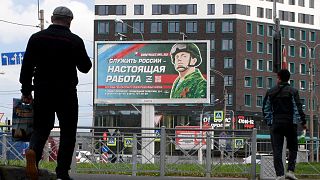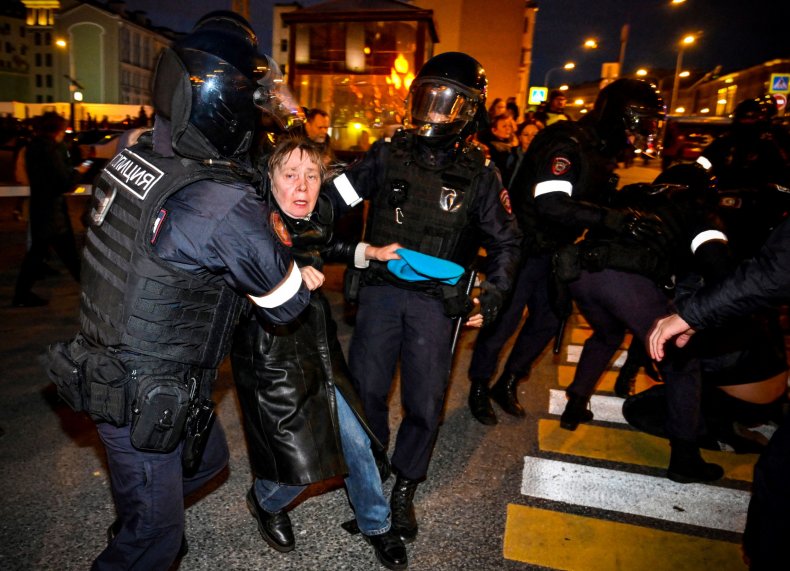Russia's Unpopularity
"Putin’s latest move in some ways reinforces the sanctions we have imposed to date, because it will hopefully increase discontent among the population.""It is no longer just professional soldiers, people from remote regions or convicts who are being sent to the front, but the desire is for everyone to be relegated to cannon fodder."Estonia's interior minister Lauri Laanemets"Due to security reasons, Latvia will not issue humanitarian or other types of visas to those Russian citizens who avoid mobilization."Latvia's foreign minister Edgars Rinkevics"[Each asylum case would be weighted separately, but [the country] does not have the purpose and capacity to issue visas on humanitarian grounds to all Russian citizens who apply for them."Lithuania's interior ministry"Being drafted into the army is not enough [of a reason for Russians to get asylum in this country, which borders the Russian exclave of Kaliningrad]."Lithuanian Defense Minister Arvydas Anusauskas
 |
| In this photo taken on September 20, 2022 a billboard promoting contract army service with an image of a serviceman and the slogan reading "Serving Russia is a real job". OLGA MALTSEVA/AFP |
An
independent Russian research agency, the Levada Center, states that 75
percent of Russians had no problem supporting Russia's invasion of
Ukraine, back in June. At the present time, however, in the wake of
Vladimir Putin's draft announcement of up to 300,000 reservists,
response rates and findings of Russian sentiment had not changed
essentially. While Russians, by and large -- and that includes the
expatriate community abroad -- support Moscow's invasion of Ukraine,
Russian men now find reason to leave their country.
Even
the Russian diaspora in Germany is in full support of Russia's war in
Ukraine. Ukrainians living in Germany have experienced ethnic Russian
harassment to the extent they no longer feel safe in Germany. As some
journalists, activists and academics whose specialty is the
Russo-Ukrainian war argue, "anti-mobilization" does not equate
necessarily with "antiwar". The belief is that a sizable proportion of
Russian draft dodgers are war supporters, not genuine dissidents,
choosing the evade the consequences of their own political views.
Putin's
announcement of the partial draft has served to destabilize Russia. The
number of protests that have roiled the establishment was not
unexpected; that very concern kept the Kremlin from announcing a general
draft, to this point. An estimated 200,000 Russians -- mostly younger
men -- have made haste to flee their country with outbound flights sold
out. Traffic jams are as long as 20 kilometres at the Georgian border.
There have been Google searches on "how to break arm". Even Moscow and
St.Petersburg are seeing vociferous protests.
The
extent of the pushback against mobilization has resulted in Russia
toughening punishment for wartime desertion and refusal to serve. The
Baltic states of Estonia, Latvia and Lithuania, along with Finland,
state they have no intention of providing refuge to Russians fleeing the
draft. Security concerns are cited. And they are linked to the Russian
government propensity to justify such wars in the claim it is protecting
Russian-speaking minorities in its near-abroad.
An
estimated one million people are ethnic Russians of the six million in
the Baltic states, representing 17 percent of the population. Increasing
the Russian population is a non-starter for former Soviet satellite
countries. Russians upset about conscription should remain in their own
country and protest their government decisions, and not absent
themselves, according to the Estonian prime minister.
Russians
making the effort to cross borders into neighbouring countries often
identify their sentiments by the stickers they have pasted on their
vehicles; pro-war "Z" and "V" stickers. Neighbouring nations feel no
obligation to shelter pro-war Russians fleeing conscription to a war
they support. Once abroad and safe from call-up they are able to
continue supporting the war from international cafes and bars where they
tend to congregate.
Accordingly,
border agents in Georgia are turning back cars labelled with Putinist
symbols. To the present, the war has been fought by recruiting soldiers
from the poorer regions of Russia, in particular Mongolia, Dagestan,
Chechnya -- where minorities have been placed as cannon fodder while
Muscovites live comfortably, supporting a conflict they have been
shielded from, up to now.
"We as a European Union, in principle, stand in solidarity with the Russian citizens who have the courage and bravery to show their opposition to what the regime is doing, especially when it comes to this illegal war in Ukraine, and especially in the circumstances like the war, like censorship and other restrictive measures that have been imposed in terms of limiting and curtailing the freedom of expression, freedom of media, freedom of expressing different opinion than the official propaganda is pushing on people,""And we also feel sympathy with those Russian families who are fearing for their sons, brothers or fathers who are being sent to die in a senseless war, illegal war. So we feel with these people and this is something that the European Union ministers also are taking into account and discussing.""The bottom line is we are aware of the situation. This is happening already. Half a million of Russians have left the country since the start of this invasion. The brightest people, the most talented people are leaving, but they found their place either in Europe or worldwide. And we are dealing with this problem and we are discussing the ways how to exactly the best in order to show our solidarity and also to ensure the security and safety of the member states."EU Commission spokesman Peter Stano
 |
Labels: Baltic Nations, Draft, European Union, Mobilization, Russian Invasion of Ukraine, Russian Refugees

<< Home